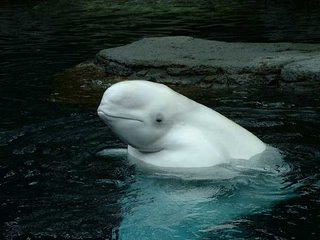Beluga Whales
 How cute are these guys?
How cute are these guys?Beluga whales are small whales that live in artic waters. They are born grey but become white as they get older. Belugas are very social and playful animals, and have some characteristics that set them apart from other whales. They have a flexible neck and can "make faces" with their lips and forehead, so are often described as being very expressive. Apparently, at some aquariums around the world, the belugas go right up to the glass and make faces at the children, who return the favor. It's thought that the facial expressions assist in nonverbal communication in the wild (Ridgway and Harrison, 1981), but some wonder if the belugas antics are done for the children peering through the glass.
Belugas are called the "canaries of the sea" because of their varied vocalizations. Their calls have been described as barks, chirps, gurgles, grunts, groans, mews, moos, squeaks, trills, whistles, and yaps. Besides their natural sounds, beluga whales can also imitate the sounds made by people and other animals. A beluga whale named Logosi who lived at the Vancouver Aquarium in Canada even learned to say his own name.
Beluga whales create sounds by moving air between sacs near the blowhole. As the air moves from sac to sac, it is forced through the "lips" of the sacs. The air vibrates the lips as it passes, and these vibrations produce noise. Once vibrations have been produced, they pass through an organ called the melon. The melon, located inside the beluga's head, is a fatty ball that contains oils of different thicknesses. It is this organ that gives the beluga's forehead its rounded appearance. As it makes sounds, a beluga whale uses muscles in its head to change the shape of the melon. Doing this changes the oils a noise must pass through and changes the melon's thickness. A beluga controls its melon to fine-tune its vocalizations. (While singing, changes in the melon mean the forehead constantly changes shape.)
So cute.
I'm conflicted as to whether it's a good thing to have these wild creatures in captivity. Now, before you jump all over this, hear me out. It's not fair to the animals to have to undergo a traumatic capture and transport to an aquarium, where they live the rest of their lives confined in a relatively small and unchanging environment. It's wrong to hunt down an animal to add to aquarium income or increase their prestige. On the other hand, you have animals like Gasper, who were saved from even more dire environments. Of course, the ideal situation would be to treat his medical problems and once healthy, let him go back to the wild. But for those born in captivity, that may not be an option. What's done is done, and in these special circumstances, we should weigh the risks and benefits of captivity versus release and do what is in the best interest of the animal. If that happens to be captivity, then we should take advantage this special opportunity to learn from and treasure these magnificent creatures.


3 Comments:
This is a wonderful article and I hope to read more about Beluga's as well as any other animal that you decide/decided to write about. To improve this article, you could/can add more information about Beluga's and people love pictures, too! Great Job, keep up the good work.
-mercy
i know what you mean about the whales being in captivity...but...if they weren't are you sure they wouldnt be on the verge of becoming extinct...these are very lovable animals...i am in love with them...and i would hate to see them become extinct...its not all about the attraction and income...its about saving them...knowing how to treat them and also other animals...they are very happy where they are...and as long as they are...then everyone else should be happy for them...i am going to try to become a marine biologist so i can help save beluga whales and other animals from becoming extinct...but i also think this is a great post...you seem to know alot about them...others will know about this website to see what they are about...and i will make sure of that!!!
I love these animals as well and I hate to see them suffer. I actually think an even bigger problem is the tours that take place in the artic that allow people to swim with them. These tours give belugas the false impression that people are friendly which can have deadly results for the animals during the hunting season of the native arctic people. This needs to stop.
While I disagree with hunting in general, Native Americans who have carried this on for thousands of years can argue that they need to continue this as their tradition. But let's not give them an advantage with easy targets. Belugas in the wild need to avoid humans as much as possible so that they don't end up as food for people who now have other alternatives...
Post a Comment
<< Home